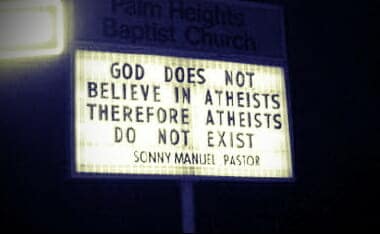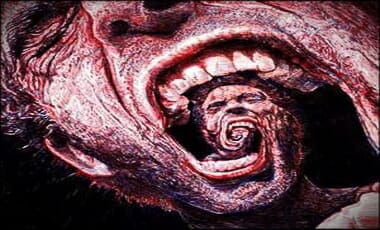…another conversation I had with Countess that I kept was THIS ONE. This conversation was, however, from 12/2001 that I am only now uploading… (found it buried in my Microsoft Word files. Enjoy:
Responding to a Skeptic
Countess, you mentioned that “we have no way to quantify the power of God, or his ability to disturb the balance of the universe,” to quote you. I find this to be a patently false statement. However, I see it as such not because you meant it to be, but because you are not defining your terms and quantifying your thoughts. I will explain how we can apply attribute to the Necessary Being through logic and nature (I will do so by explaining it to a non-theist). This next section is taken primarily from the book Why I Am A Christian: Leading Thinkers Explain Why They Believe, pp. 62-64, edited Norman L. Geisler and Paul K. Hoffman. (books referenced with the asterisk, *, are in my home library – which, for those keeping track over the years, is now well over 1,800.)
Have you ever asked yourself where the universe came from? Why everything exists instead of nothing? Typically, atheists have said the universe is just eternal, and that’s all. But surely this is unreasonable. If the universe never had a beginning, that means the number of past events in the history of the universe is infinite. But mathematicians recognize that the idea of an infinite number of things leads to self-contradictions. For example, what is infinity minus infinity? Mathematically, you get self-contradictory answers. If you subtract all the odd numbers 1, 3, 5, … from all the natural numbers 0, 1, 2, 3, …, how many numbers do you have left? An infinite number. So infinity minus infinity is infinity. But suppose instead you subtract all the numbers greater than 2 – how many are left? Three. So infinity minus infinity is 3! It needs to be understood that in both of these cases we have subtracted identical quantities from identical quantities and come up with self-contradictory answers. In fact, you can get any answer you want from zero to infinity! This shows that infinity is just an idea in one’s mind, not something that exists in reality. David Hilbert, perhaps the greatest mathematician of this century, states, “The infinite is nowhere to be found in reality. It neither exists in nature nor provides a legitimate basis for rational thought. The role that remains for the infinite to play is solely that of an idea” (*David Hilbert, “On the Infinite,” in Philosophy of Mathematics, edition with an introduction by Paul Benacerraf and Hillary Putnam, pp. 139, 141). Therefore, the series of past events can’t go back forever; rather, the universe at some point must have begun to exist. [Which the theist and deist both believe.]
This conclusion has been confirmed by remarkable discoveries in astronomy and astrophysics. The astrophysical evidence indicates that the universe began to exist in a great explosion called the big bang. Physical space and time were created in that event, as well as all matter and energy in the universe. Therefore, as Cambridge astronomer Fred Hoyle points out, the big bang theory requires the creation of the universe from nothing. This is because, as one goes back in time, he reaches a point at which, in Hoyle’s words, the universe was “shrunk down to nothing at all” (*Fred Hoyle, Astronomy and Cosmology, p. 658). Thus, what the big bang model requires is that the universe began to exist and was created out of nothing.
This tends to be very awkward for the atheist, for as Anthony Kenny of Oxford University urges, “A proponent of the big bang theory, at least if he is an atheist, must believe that the … universe came from nothing and by nothing” (Anthony Kenny, The Five Ways: St. Thomas Aquinas’ Proofs of God’s Existence, p. 66). But surely that doesn’t make sense. Out of nothing, nothing comes [law of nature]. In every other context, atheists recognize this fact. The great skeptic David Hume wrote, “But allow me to tell you that I never asserted so absurd a Proposition as that anything might arise without a cause” (*David Hume, The Letters of David Hume, p. I:187. I own a more recent compilation than the one quoted here). The contemporary atheist philosopher Kai Nielson gives this illustration: “Suppose you suddenly hear a loud bang… and ask me, ‘What made that bang?’ and I reply, ‘Nothing, it just happened.’ You would not accept that. In fact you would find my reply quite unintelligible” (*Kai Neilson, Reason and Practice, p. 48). But what’s true of the little bang must be true of the big bang as well. So why does the universe exist instead of just nothing? Where did it come from? There must have been a cause that brought the universe into being. As the great scientist Sir Arthur Eddington said, “The beginning seems to present insuperable difficulties unless we agree to look on it as frankly supernatural” (*Arthur Eddington, The Expanding Universe, p. 124).
We can summarize the argument thus far as follows:
- Whatever begins to exist has a cause.
- The universe began to exist.
- Therefore, the universe has a cause.
Given the truth of the first two premises, the third necessarily follows.
From the very nature of the case, as the cause of space and time, this supernatural cause must be uncaused, changeless, timeless, and immaterial being that created the universe. The being must be uncaused because we’ve seen that there cannot be an infinite regress of causes [a necessary being is demanded by science and logic]. It must be timeless and therefore changeless because it created time. Because it created space, it must transcend space as well and therefore be immaterial, not physical.
Moreover, I would argue, it must also be personal, for how else could a timeless cause give rise to a temporal effect such as the universe? If the cause were a mechanically operating set of necessary and sufficient conditions, then the cause could never exist without effect. For example, water freezes because the temperature (the cause) is below 0 degrees C. if the temperature were below 0 degrees from eternity past, then any water that was around would be frozen from eternity. It would be impossible for the water to begin to freeze just a finite time ago. So if the cause is timelessly present, then the effect should be timelessly present as well. the only way for the cause to be timeless and the effect to begin in time is for the cause to be a personal agent who freely chooses to create an effect in time without any prior determining conditions. For example, a man sitting from eternity could freely will to stand up. Thus, we are brought not merely to a transcendent cause of the universe but to its personal Creator.




